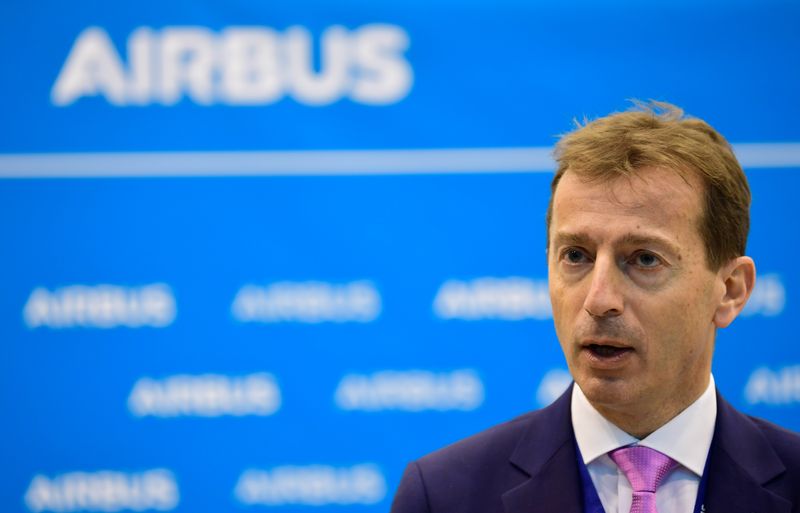By Tim Hepher
PARIS (Reuters) -Europe's Airbus clashed on Friday with U.S. giant Raytheon Technologies (NYSE:RTX) over plans for a record leap in jetliner output, after the industry's largest contractor questioned whether a battered supply chain could keep up.
The world's largest planemaker said it was sticking with a two-part plan to raise output by 50% from current levels in 2025 - a goal that would contribute to Airbus becoming the first civil planemaker to deliver 1,000 planes in a single year.
Chief Executive Guillaume Faury said demand was likely to outstrip supply for the most-produced medium-haul models where Airbus enjoys a lead over U.S. rival Boeing (NYSE:BA).
But speaking at the company's first full-scale investor event for four years, he acknowledged worries from inflation to interest rates and said the wide-body recovery was less certain.
"We are in a period where things are accelerating; we have multiple crises to manage," Faury said.
He talked of a possible share buyback as Airbus rebuilds cash depleted by what he called the "existential crisis" of COVID-19, but cautioned "we are not there yet".
Airbus shares floated in and out of positive territory and by mid-afternoon were up 0.4%.
A travel bounce-back outside China has seen demand for medium-haul A320neo and Boeing 737 MAX jets recover faster than expected. But Airbus' plans to build 75 A320neo-family jets a month in 2025, up from around 50 now, have met with some scepticism.
The head of Raytheon (NYSE:RTN) Technologies, which owns engine maker Pratt & Whitney, told a conference last week that Faury "might say rate 75, but we think rate 65 is doable" by 2025.
Faury called the comments "really unhelpful" and said engine makers were worried by the timing, not the number. "They believe in 75. I can be quoted because I checked," he told investors.
Raytheon had no immediate comment.
Reuters reported this week Airbus had relaxed pressure on suppliers to commit to the 2025 deadline, leaving room for it to slip to 2026, but was sticking to targets for now. The company has not said when in 2025 it might hit the 75 goal.
The key, suppliers say, is when targets can be hit consistently.
"We will see when we plan to hit rate 75, in (20)25 hopefully. I am committed to (20)25. That's probably something we will be communicating more precisely on at our full-year results," Faury said on Friday.
A220 UPGRADE
Airbus meanwhile gave the strongest hint yet that it plans to launch a bigger version of its 110-to-130-seat A220 passenger jet but gave no clues about the decision's timing.
A stretched version of the lightweight airplane makes a lot of sense, "but we don't want to be right too early", Faury said.
The A220 was developed with an eye on the main part of the jet market but Canada's Bombardier (OTC:BDRBF) struggled to keep up with the investments needed to displace Airbus and Boeing and sold its aerospace jewel to Airbus in 2018.
Airbus has faced higher-than-expected costs on the loss-making programme but believes it can break even by mid-decade.
An A220-500 would begin the process of replacing the 150-seat-plus A320neo, Europe's aerospace cash-cow and a major battleground in the transatlantic war for sales with Boeing.
Airbus has seized a commanding lead in the main part of the single-aisle market, most recently through the larger A321neo, which finance chief Dominik Asam said would have an increasing proportion of sales.
Although Airbus was born as a producer of wide-body long-haul jets with the A300, which took flight 50 years ago next month, its biggest commercial success by far has been in workhorse single-aisle jets made popular by budget carriers.

Improvements in the largest single-aisle jets have eaten into the lower end of a market reserved for decades for wide-body jets like Boeing's 747, 777 and 787 or the Airbus A350.
Faury said Airbus aimed to step up competition with Boeing in the wide-body market, starting with the new A350 Freighter. Experts say Boeing dominates air cargo and has so far outsold the A350 with its future 777X Freighter.